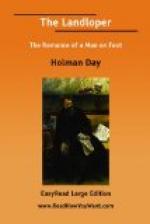“Say it short,” growled Farr, clenching his fists as if he wanted to beat indulgence for the child out of the hide of the world. “I’m paying you for her life.”
“I have nothing to sell you in this case—therefore there can be no pay.” He leaned over the bed and smoothed the moist, tangled hair away from the child’s brow. “I can only give you something, my friend. I give you all my sympathy. This baby is departing on a long journey, and I’m Christian enough to believe that the way will be made very smooth for the feet of little children. That’s the faith of an old man.”
There were both earnestness and tenderness in his tones—the smugness of the physician was gone. He shook Farr’s hand and went out of the room, treading softly.
And the next day Rosemarie’s tiny fingers stopped their flutterings and she went away—somewhere!
XI
THE LORDS OF THE CITY
Walker Farr would not allow the tiny body of Rosemarie to be carried away in the white hearse. In his grief he had not been able as yet to dissociate the identity of the child from the poor little tenement in which her spirit had dwelt for the few barren years of her life; it seemed to him that she would be very lonely in the white hearse. He rode to the cemetery, holding the tiny casket across his knees. There was only the one carriage—it was sufficient to carry the friends of little Rosemarie: one Walker Farr and old Etienne and play-mamma Zelie Dionne.
The rack-tender sat opposite Farr and nursed a bundle on his knees. He had wrapped it surreptitiously.
The two men sent Zelie Dionne back to the city in the carriage. But they waited beside the grave until the sexton had finished his work; Farr felt an uncontrollable impulse to wait till all was ended, as he had always waited every night till the little girl was sound asleep and tucked up in bed in the good woman’s house. He sat crouched on the edge of a turfed grave, elbows on his knees, his hands clutched into his shock of hair.
After the sexton had departed, tools on his shoulder, Etienne unwrapped the bundle. He began to arrange the child’s toys on the grave.
“It is as the others do—the fathers and mothers of our faith in the tenement-houses,” he explained, wistfully, to the young man. He pointed to other graves in the vicinity, short and narrow graves. Toys were spread on them, too. They were the poor treasures of dead children. The toys had been left there in the vague, helpless yearning of parents who strove to reach their human consolation beyond the grave.
Farr gazed on these pitiful memorials of the children—from those graves to the new mound which covered Rosemarie. The ache that had been in his throat for so many hours grew more excruciating. He realized that a father in those circumstances would weep, but he did not feel like shedding tears, and he was ashamed of himself for what seemed lack of something within himself. What he felt then, what he had felt ever since that young doctor had passed sentence of death was surly, bitter rancor—the anger of a man who is robbed.




